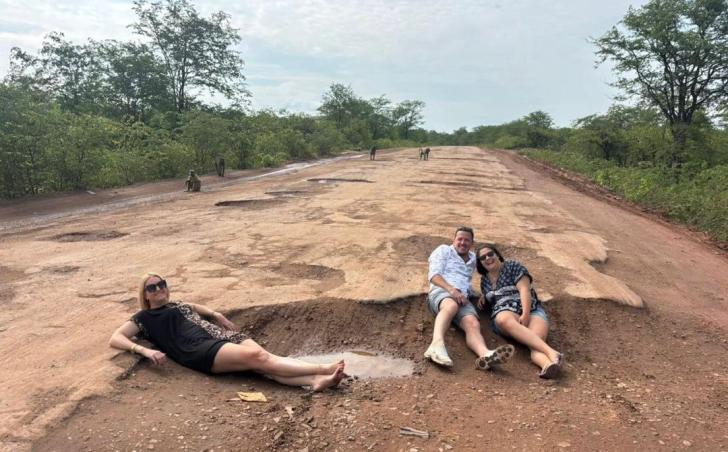News / National
Victoria Falls: A world wonder at risk as Bulawayo-Victoria Falls road crumbles
07 Jun 2025 at 09:45hrs |
0 Views

A weekend trip to Victoria Falls offers breathtaking experiences - from a serene breakfast at Makuwa Kuwa Restaurant, perched on the cliffs of Victoria Falls Safari Lodge, to mesmerizing views stretching across Zimbabwe, Zambia, and Botswana. But beneath the beauty and luxury lies a harsh reality threatening this iconic destination: the near-collapse of the Bulawayo–Victoria Falls Road.
The scenic journey from Bulawayo to Victoria Falls, a critical 439-kilometre artery cutting through wildlife-rich and mining areas, has become a nightmare for motorists. Once a proud highway, it is now riddled with deep potholes and gullies, some so large elephants drink from them, while tourists sometimes joke by bathing in these "natural pools" for social media.
This vital road feeds one of Africa's prime foreign currency-earning destinations but has been neglected for decades despite the government collecting billions in taxes. Heavy rains worsen the damage, and a surge in coal mining and haulage trucks has further ravaged the pavement, especially along the 100-kilometre stretch between Hwange and Victoria Falls. Here, trucks crawl through cratered sections, break down frequently, and deadly accidents have become common.
The Emergency Road Rehabilitation Programme (ERRP), touted as the government's solution over the past five years, has failed to stem the decline. Instead, the road is now a chokepoint that directly impacts tourism - Zimbabwe's third-largest contributor to GDP.
Farai Chimba, president of the Tourism Business Council of Zimbabwe, expressed concern over the impact on domestic tourism. "Locals opted for regions like the Eastern Highlands and Masvingo that enjoy better roads," he said. "Key resorts such as Kariba are struggling to attract weekend and conference business, with occupancies declining and some operators exiting."
Anald Musonza of Africa Albida Tourism, owners of Victoria Falls Safari Lodge, added: "That road needs urgent attention. It used to be a road, but now even 4x4s take twice as long. Domestic tourism is suffering. Victoria Falls is simply not accessible."
Kalai Safaris CEO Charles Chakanya pointed to the mining boom and haulage trucks as major culprits. He advocated for the adoption of the "Polluter Pays Principle" (PPP), a legal framework that would hold those causing damage - miners and haulage firms - accountable for repair costs. Chakanya also suggested reviving the National Railways of Zimbabwe to reduce heavy road traffic.
The neglect of this highway is not just an inconvenience; it is a threat to lives and Zimbabwe's tourism future. Crashed vehicles and tragic accidents line the road, a sobering reminder of the stakes.
This weekend, as President Emmerson Mnangagwa celebrated the commissioning of the US$88 million Trabablas Interchange in Harare - a flagship ERRP project - the Bulawayo–Victoria Falls Road continues to crumble, signaling a disconnect between grand infrastructure projects and ground realities.
Victoria Falls remains a jewel of Africa's tourism crown, a place where wild elephants drink, vultures soar, and the Zambezi flows majestically. But unless urgent action is taken to fix the road, this wonder risks becoming a cruel irony: a world-class destination marooned by broken roads, where tourists come cautiously - if at all.
For Zimbabwe, the message is clear: paradise must be reachable, or risk losing the very visitors it seeks to attract.
The scenic journey from Bulawayo to Victoria Falls, a critical 439-kilometre artery cutting through wildlife-rich and mining areas, has become a nightmare for motorists. Once a proud highway, it is now riddled with deep potholes and gullies, some so large elephants drink from them, while tourists sometimes joke by bathing in these "natural pools" for social media.
This vital road feeds one of Africa's prime foreign currency-earning destinations but has been neglected for decades despite the government collecting billions in taxes. Heavy rains worsen the damage, and a surge in coal mining and haulage trucks has further ravaged the pavement, especially along the 100-kilometre stretch between Hwange and Victoria Falls. Here, trucks crawl through cratered sections, break down frequently, and deadly accidents have become common.
The Emergency Road Rehabilitation Programme (ERRP), touted as the government's solution over the past five years, has failed to stem the decline. Instead, the road is now a chokepoint that directly impacts tourism - Zimbabwe's third-largest contributor to GDP.
Farai Chimba, president of the Tourism Business Council of Zimbabwe, expressed concern over the impact on domestic tourism. "Locals opted for regions like the Eastern Highlands and Masvingo that enjoy better roads," he said. "Key resorts such as Kariba are struggling to attract weekend and conference business, with occupancies declining and some operators exiting."
Kalai Safaris CEO Charles Chakanya pointed to the mining boom and haulage trucks as major culprits. He advocated for the adoption of the "Polluter Pays Principle" (PPP), a legal framework that would hold those causing damage - miners and haulage firms - accountable for repair costs. Chakanya also suggested reviving the National Railways of Zimbabwe to reduce heavy road traffic.
The neglect of this highway is not just an inconvenience; it is a threat to lives and Zimbabwe's tourism future. Crashed vehicles and tragic accidents line the road, a sobering reminder of the stakes.
This weekend, as President Emmerson Mnangagwa celebrated the commissioning of the US$88 million Trabablas Interchange in Harare - a flagship ERRP project - the Bulawayo–Victoria Falls Road continues to crumble, signaling a disconnect between grand infrastructure projects and ground realities.
Victoria Falls remains a jewel of Africa's tourism crown, a place where wild elephants drink, vultures soar, and the Zambezi flows majestically. But unless urgent action is taken to fix the road, this wonder risks becoming a cruel irony: a world-class destination marooned by broken roads, where tourists come cautiously - if at all.
For Zimbabwe, the message is clear: paradise must be reachable, or risk losing the very visitors it seeks to attract.
Source - Zimbabwe Independent
Join the discussion
Loading comments…































